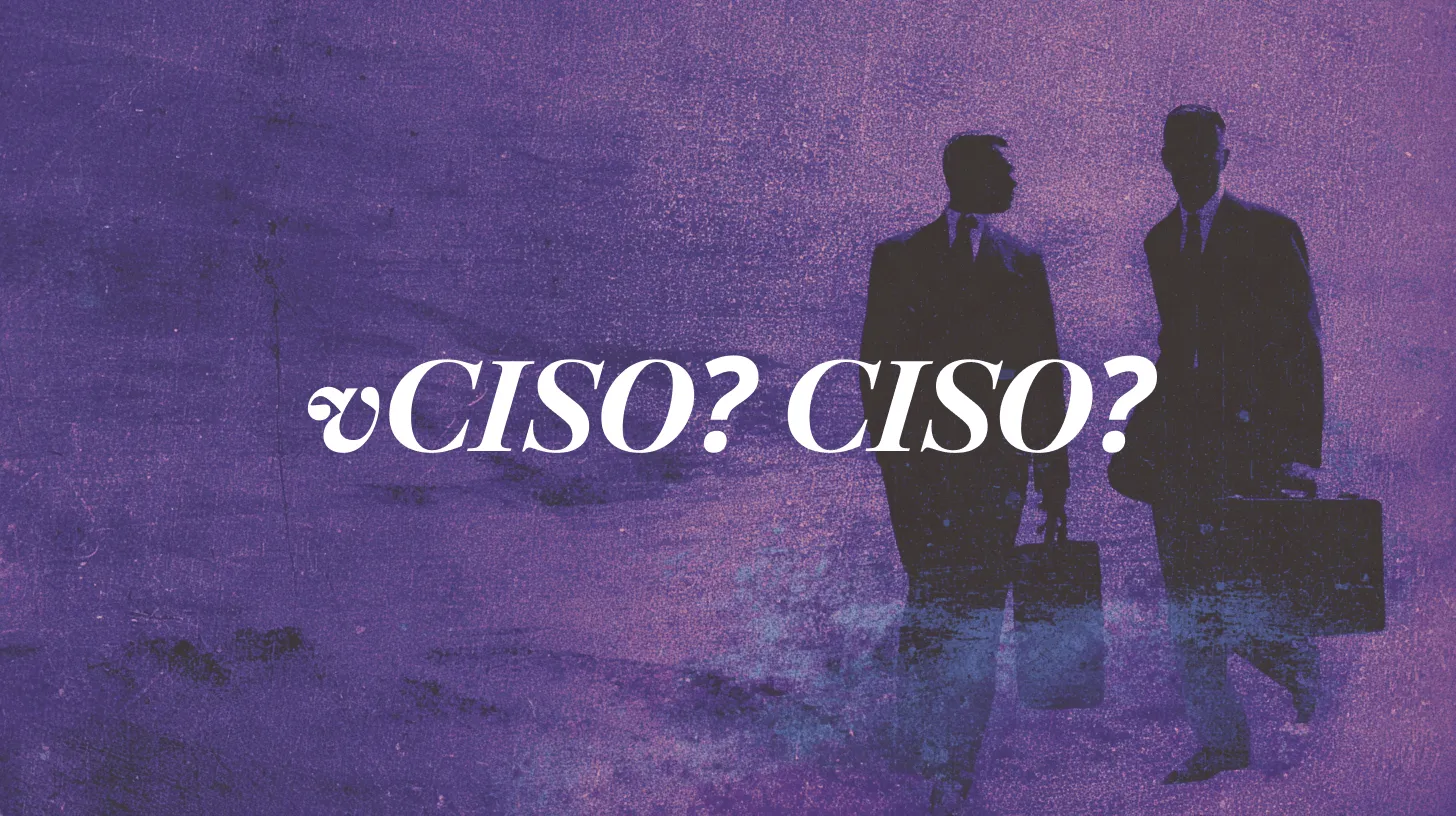vCISO vs. CISO: How to Make the Right Choice (From Someone Who Operates as Both)
Does your company need a vCISO or a full-time CISO? Learn the key differences and how to make the right choice for your security and compliance strategy in 2025.

I've built security programs from both sides, as a full-time CISO and as a vCISO to dozens of companies.
Here's what I've learned: Your security leadership should match your business stage, not your ambition. Companies under 100 employees rarely need a full-time CISO, but they may need senior security expertise - especially as they start to scale quickly.
That's why the virtual CISO (vCISO) model has gained traction. A vCISO gives companies access to senior security expertise without the commitment, overhead, and lag time of hiring a full-time CISO.
While a traditional CISO brings deep, dedicated focus to mature security programs, a vCISO brings flexibility and speed to growing ones as well as outside perspective and expertise.
Here's how to know which model fits your situation, as well as when “both” may be the answer.
What is a vCISO?
A virtual Chief Information Security Officer (vCISO) is a senior security leader hired on a flexible basis, usually part-time or contractual. They deliver senior security leadership on demand without the overhead of a full-time senior security hire.
vCISOs work because they solve specific problems:
For young, fast-growing companies a vCISO offers scalable security support to fit your needs in the moment.
For companies with existing security teams a vCISO can add surge capacity during audits, offer specialized expertise, and provide fresh perspective on your cybersecurity strategy.
For companies between startup and scaleup stages hiring a vCISO gives you the opportunity to work out what security leadership you actually need before making a permanent hire.
Many companies with a full-time CISO also keep vCISOs on retainer. When your CISO is slammed with an audit or needs additional support, a vCISO provides immediate backup without the hiring lag or cost. Many Workstreet partners use our vCISO service to support their internal CISO as needed.
What is a CISO?
A Chief Information Security Officer (CISO) is a full-time senior executive responsible for leading an organization’s information security program. Because they’re in-house, CISOs are ingrained into the company operations, work closely with leadership and internal teams, and drive day-to-day security operations.
They’re also responsible for building and managing the in-house security teams as well as providing leadership and guidance to the rest of the company, including hiring and training colleagues.
vCISO vs CISO: What are the Key Differences?
Both vCISOs and CISOs own your security strategy and risk management. The main differences are around how they deliver it.
If you’re looking for speed and flexibility, a vCISO may be the best fit. You can bring one in within days, not the months it takes to hire a full-time CISO and they scale up during audits, and scale down during quieter times.
If you’re looking for internal leadership and institutional knowledge, a full-time CISO will become part of your organization's DNA, available immediately for urgent decisions and embedded in daily operations.
Cost should also be a factor. A full-time CISO can cost $200,000-$300,000+ annually in salary alone, plus benefits, bonuses, and PTO. They’re definitely worth that compensation. But if you’re earlier in your journey, a vCISO on retainer can be more cost effective at $3,000-$8,000 monthly.
Both CISOs and vCISOs can:
- Lead security strategy, developing and executing security strategies that align with the company’s long-term goals.
- Oversee risk management and incident response, identifying threats, ensuring mitigation measures are in place, and coordinating with teams if a breach or security threat occurs.
- Drive compliance, ensuring the business is aligned with industry standards and regulations, including conducting audits and establishing security protocols.
Which Role Fits Your Current Needs?
Choosing between a vCISO and a CISO can be difficult, especially if you’re going through a stage of hypergrowth.
Under 80-100 employees? A vCISO may be the most natural fit. The flexibility, speed, and cost savings are significant and you can still get incredible results. At Workstreet, our vCISO service can help startups get audit-ready in 1-2 weeks instead of months. Plus, a vCISO can help avoid burning valuable founder time on security tasks.
Over 100 employees or in an industry with complex security needs? You may want to start evaluating full-time employee options sooner rather than later. Sometimes that's a CISO. Sometimes it's a senior security engineer. It depends on whether you need strategic leadership or hands-on technical work more.
Here's what I find usually drives the CISO vs. vCISO decision:
- If speed matters: vCISO wins. They start in days while CISO hiring takes 3-6 months.
- If you're a startup buying security software: Get a vCISO. Implementing Vanta or Drata without expert guidance means burning a lot of time across your leadership team when a vCISO could handle it faster and more effectively.
- If you're in a heavily regulated industry: You might need an on-site CISO earlier than the 100-person mark, but many regulated companies still succeed with vCISOs who know their specific compliance requirements (e.g. HIPAA).
- If your security needs fluctuate: vCISO scales with you. Audit season? They're all in. Quiet quarter? You're not paying for idle time.
- If you're building long-term security culture: A CISO eventually makes sense, but starting with a vCISO helps you understand what kind of CISO you actually need and how security and compliance relates to your business goals.
A Hybrid CISO + vCISO Solution Can Also Work
In-house CISO vs. vCISO doesn’t have to be an either/or decision, many hypergrowth businesses benefit from both.
We see a number of companies with a full-time CISO keep a vCISO on retainer for additional flexibility. This hybrid model provides surge capacity during audits and brings fresh perspectives on complex problems.
How to Choose the Right vCISO
The right vCISO will have a deep cybersecurity leadership experience and should be able to give you strategic guidance from the off without needing a long onboarding period.
Here's what actually matters when it comes to finding the right vCISO for your business:
- Speed: Can they get you audit-ready in weeks, not months? If they're promising 30 days, that's already too slow. The best vCISOs compress timelines because they've solved your exact problem before.
- Track record: Not years of experience, actual outcomes. How many audits passed? What’s their pass rate percentage? Who have they worked with?
- Scalability: vCISOs should offer flexibility without disruption, ramping up and down with the needs of your business. Their services should also be tailored to your specific cybersecurity needs rather than a one-size-fits-all offering.
- Vision and leadership: A vCISO should instantly get your business and be able make informed decisions and leadership on as well as keeping an eye on your long term business goals .
Ready to Elevate Your Security Program?
Workstreet can bolster your security team without the full-time cost. Our VCISO services are perfect for companies who need security resources but aren't ready for a full-time executive or want to augment their existing team.
From initial assessment to ongoing strategic guidance, we'll transform your security posture. Here’s are the four-steps we take to optimize security ops;
- Security Program Assessment: Comprehensive evaluation of your current security posture, gaps, and immediate needs
- Strategic Planning & Roadmap: Develop a customized security strategy aligned with your business objectives and risk tolerance
- Implementation Support: Hands-on guidance for implementing security controls, policies, and procedures
- Ongoing Leadership & Optimization: Continuous security program management, board reporting, and strategic guidance
See how Workstreet’s security solutions can help you achieve your goals faster.
vCISO vs. CISO FAQs
When should a company hire a vCISO instead of a CISO?
Your company should hire a vCISO when senior-level expertise and leadership are needed, but a full-time CISO can’t be justified. vCISOs are ideal for startups or growing companies that need expertise quickly without the commitment or cost of a CISO: when offering strategic planning, preparing audits, and building a security program.
Also if you’re starting to invest in compliance software like Drata or Vanta, you should definitely explore bringing in a vCISO. The time it’ll save your senior team when it comes to security and compliance will more than cover the costs.
As for when full-time makes sense, we tend to see most companies feel the need to shift to a full-time CISO when they hit between 80-100 employees.
How much does a vCISO typically cost compared to a CISO?
The cost of a vCISO will depend on whether they work on a contractual, freelance, or part-time basis. However, a vCISO typically costs significantly less than a CISO because your company will be paying for their time on an as-needed basis. This might cost a few thousand dollars a month compared to over 6 figures annually.
Can a vCISO handle vendor security questionnaires and compliance audits?
Yes, just like a CISO, a vCISO can take over vendor security questionnaires and compliance audits, so the rest of your team can stay focused on core work. We can also take the lead at Workstreet.
How can you measure the success of a vCISO and a CISO?
Your company can measure the success of both a vCISO and a CISO by tracking KPIs. Common ones include audit pass rates, the time taken to resolve issues, and the reduction in risk exposure. Often, success for a vCISO is about flexibility, speed, and specific project outcomes, while success for a CISO is about establishing long-term security, compliance, and performance.
What certifications should a vCISO or CISO have?
The right certifications indicate the individual has the expertise needed to back up their track record. For many businesses, hiring a CISO with an MBA (Master of Business Administration) is recommended as they are expected to be an executive leader in the company. For a vCISO, common certifications include:
- CISSP - Certified Information Systems Security Professional
- CISM - Certified Information Security Manager
- CCSP - Certified Cloud Security Professional
- CISA - Certified Information Systems Auditor


